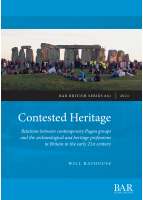Description
This book examines the sometimes fraught interactions and relationships between contemporary Pagan groups and archaeological heritage managers in the first decade and a half of the 21st century. It uses ethnographic field research, conducted by the author between 2008 and 2013, and literature analysis to analyse those interactions. The two key areas examined are access to, interpretation of and preservation of ancient sites, and the archaeological examination, storage and display or reburial of ancient human remains. The book includes a detailed analysis of the reasons presented in the discourse of contestation and the underlying attitudes behind the issues. It concludes with some thoughts on how heritage managers and archaeologists may better manage their interactions with the Pagan community in the future.
AUTHOR
Will Rathouse is a community engagement archaeologist for MOLA (Museum of London Archaeology) working on the Thames Discovery programme. His responsibilities include outreach to older Londoners and bringing in new groups to benefit from the project, including people with mental health problems and forces veterans. Previously, he was a support officer for Mind Aberystwyth and led archaeology projects to promote mental health. He has also volunteered with Operation Nightingale. His PhD research investigated contestation of prehistoric monuments and ancient human remains by contemporary Pagan groups in the UK.
REVIEWS
‘The particular contribution of this work is in synthesising and collating the varying attitudes of Pagans and archaeologists to present an overarching perspective that nonetheless avoids the (often dismissive) perspective of the archaeological profession and Pagan hostility to archaeology. The detailed coverage of Paganism and the diversity of its nature is especially important.’ Dr John Carman, Ironbridge International Institute for Cultural Heritage, University of Birmingham
‘The work offers an original and well researched examination of the relations between Pagan groups, archaeologists and heritage professionals in the UK, and the implications of these engagements for the interest groups. … Rathouse highlights diversity of thinking and the middle ground around which the interest groups might discuss and move forward.’ Dr Robert J. Wallis, The Open University
‘There is no doubt that the relationship between Pagans on the one side and archaeologists and heritage managers on the other, has long been a vexed one which has produced considerable difficulty for all. It is equally undoubted that the three groups also have a lot in common, that none of them are personal and ideological monoliths, and that they contain many individuals with a good understanding of, and sympathy for, the other groups ... A better sense of why there have been tensions between them, which have regularly erupted into direct conflict, is therefore something which would be valuable to achieve. This work systematically provides that sense, with an analysis of the cultural and ideological underpinnings of each group, and of the spectra of opinions and instincts within each. In so doing, it also furnishes a series of exact case studies to show how and why conflict has occurred over individual sites and causes, and how in some cases this has been ameliorated. It concludes with some general suggestions for better relations in future.’ Prof. Ronald E. Hutton, University of Bristol











